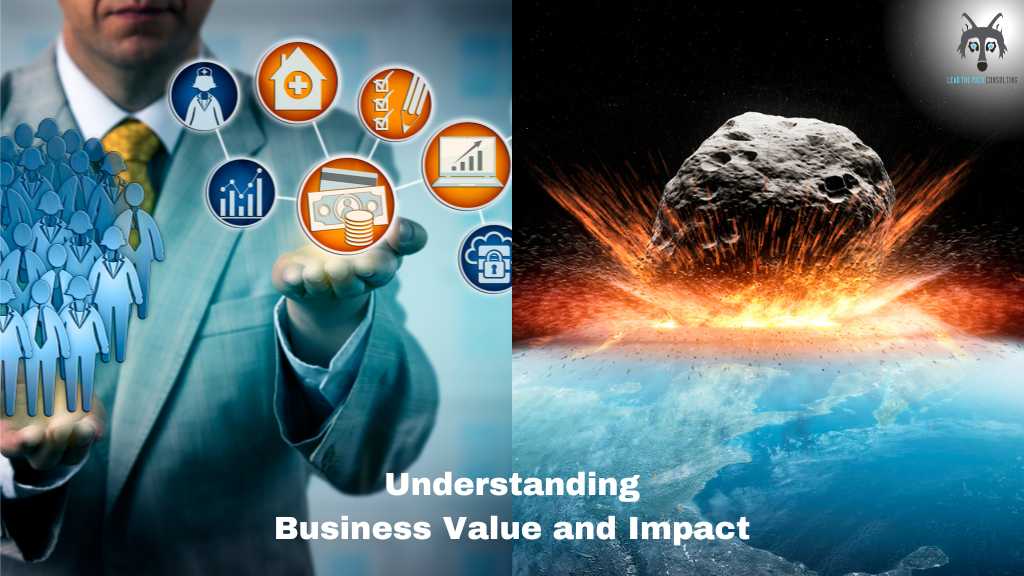In today’s competitive business environment, it is crucial to be able to demonstrate value and impact in everything you do. Whether you are a business leader, coach, or colleague, utilizing your relationships to show the value you bring and the impact of your actions can help you make informed decisions and achieve your goals. In this article, you will explore:
- what business value and impact mean
- what skills it takes to define and demonstrate them
- why they are important for leaders to share
- how having conversations about value and impact with your partners can improve your business relationships.
What is meant by business value and impact?
Business Value refers to the worth or usefulness of something. Business value can be measured in terms of financial return, customer satisfaction, productivity, or other metrics that align with organizational goals. Business Impact refers to the effect or influence that something has on something else. Impact can be positive or negative, short-term or long-term, and can affect various stakeholders such as customers, employees, shareholders, and the wider community. Impact will also have an effect on strategic objectives, customers or overall organizational conditions, through knowledge gain, different behaviours or overall change in conditions.
What skills and mindsets are needed to demonstrate business value and impact?
1. Communication Skills – You should be able to communicate complex information in a clear and concise way and be able to articulate how your work or project contributes to your organization’s goals and objectives. Developing your storytelling skills will help you convey your information in a compelling way.
2. Data Analysis Skills – You will need to gather, analyze, and interpret data to demonstrate the value and impact of your work. This could include using statistical methods, data visualization tools, and other techniques to present your findings.
3. Strategic Thinking – Thinking strategically about your work and understanding how it fits into the broader goals and objectives of your organization is important. This will help you to identify the most important metrics and key performance indicators to measure and report on.
4. Leadership Skills – Leading and motivating others to achieve desired outcomes is essential. This may include influencing others to adopt new processes or practices, coaching team members, and providing guidance and support when needed.
5. Business Acumen – You should have a good understanding of your organization’s business model, industry trends, and competitive landscape. This will help you position your work in a way that demonstrates its value and impact relative to other initiatives within the organization, as well as the external competition.
6. Adaptability – You should be able to adapt to changing circumstances and priorities. This will help you to stay focused on the most important outcomes and adjust your approach to achieve them.
By developing these skills, you will be well-positioned to define and demonstrate value and impact to leaders in your organization.
Why is demonstrating business value and impact important?
As a business leader, demonstrating value and impact is critical for building credibility and trust with stakeholders. Leaders who can articulate the value of their decisions, initiatives, and strategies will inspire confidence in their teams, clients, and partners. By understanding the impact of their actions, leaders can make informed decisions that align with organizational goals, mitigate risks, and seize opportunities. Moreover, by measuring and communicating the value and impact of their work, leaders can continuously improve their performance and learn from their successes and failures.
Why is it important in business relationships to engage in business value conversations?
In business relationships, engaging in value conversations will help partners align their goals, expectations, and outcomes. Partners can articulate their value propositions, understand each other’s needs and priorities, and create mutually beneficial solutions. Moreover, by placing importance on having the value dialogue, partners will move beyond transactional relationships and build long-term partnerships that foster trust, collaboration, and innovation.
Why discuss
1. The current situation (situational awareness)
2. The different perspectives of impact (short-term or long-term)
In collaborative efforts, situational awareness and understanding the different perspectives of impact are essential for achieving shared goals and avoiding conflicts. By discussing the current situation, partners can assess the context, identify opportunities and risks, and plan their actions accordingly. By considering the different perspectives of impact, partners can anticipate the consequences of their actions, align their expectations, and make informed decisions. Moreover, by being aware of the short-term and long-term impact of their actions, partners can balance their immediate needs with their long-term goals and sustainability.
Successful leaders demonstrate business value and impact.
In conclusion, demonstrating business value and impact is critical for leaders, coaches, and partners in today’s business environment. By understanding what value and impact mean, what skills you need to effectively convey them, why they are important, and how to focus on the value dialogue, you can build better business relationships, make informed decisions, and achieve your goals. As business leaders, you need to continuously measure and communicate the value and impact of your actions to inspire confidence in your teams and stakeholders. As partners, you need to engage in a value dialogue that aligns your goals, expectations, and outcomes and anticipates the different perspectives of impact. By doing so, you can create a more sustainable, innovative, and prosperous business environment.
Get started with one of our leadership training courses to master and demonstrate business value and impact. Reach out to our team at Lead The Pack Consulting for help creating better results.

